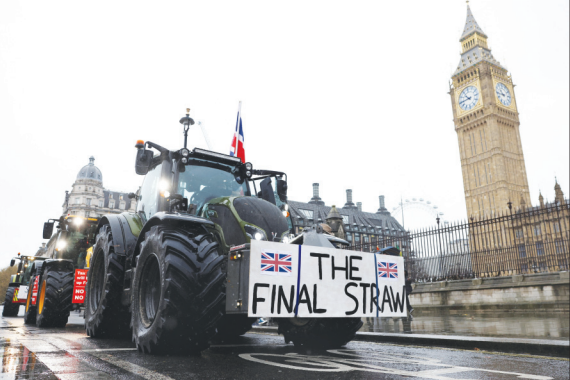How could tax-changes/” title=”Farmers Take to the Streets of Central London: A Bold Stand Against Tax Changes!”>proposed tax changes affect small farms compared to larger agricultural businesses?
“`html
Farmers Take to the Streets of Central London: A Bold Stand Against Tax Changes!
The Context of the Protest
Recently, thousands of farmers converged in Central London to voice their concerns over proposed tax changes that threaten the sustainability of agriculture across the UK. This protest, marked by its unprecedented turnout, reflects deep-rooted anxieties about how tax reforms could disrupt the livelihoods of farmers and the agricultural sector as a whole.
Reasons for the Protest
Farmers from various regions gathered to express their displeasure over several tax policy changes, including:
- Increased Tax Burdens: Farmers fear that the new policies will escalate their tax liabilities, making it more difficult to sustain their operations.
- Loss of Agricultural Subsidies: Proposed cuts to subsidies that provide financial relief to farmers could lead to financial instability.
- Impact on Small Farms: Smaller farms are disproportionately affected by tax increases compared to larger agricultural businesses.
- Environmental Regulations: Farmers argue that environmental tax policies are punitive without providing adequate support for sustainable practices.
Visualizing the Protest: Key Statistics
The protest was not only significant in terms of attendance but also in the wide range of demographic representation. Here’s a quick breakdown:
| Demographic | Percentage Representation |
|---|---|
| Young Farmers (Under 30) | 25% |
| Family-Owned Farms | 40% |
| Organic Farmers | 15% |
| Commercial Agriculture | 20% |
Benefits of the Protest
The showing of solidarity among farmers not only raised awareness but also highlighted several potential benefits:
- Strengthened Community Ties: Farmers united for a common cause, reinforcing bonds within the agricultural community.
- Increased Visibility: The protest garnered media attention, bringing agricultural issues to the forefront of public discourse.
- Policy Change Pressure: A large protest can pressure lawmakers to reconsider tax changes that could harm the agricultural sector.
Case Studies: Recent Farmer Protests in Europe
The protest in Central London is part of a larger wave of farmer activism seen across Europe. Here are two notable cases:
Case Study 1: France
In France, farmers protested against low milk prices and high production costs. The “milk crisis” led to widespread demonstrations, with farmers blockading roads and dairy facilities. In doing so, they successfully lobbied for government measures to stabilize milk prices.
Case Study 2: Netherlands
Dutch farmers protested government plans aimed at reducing nitrogen emissions. Their protests involved tractors blocking roads and demonstrations in front of government buildings. As a result, the government opened dialogues with farmers, leading to revisions in the proposed policies.
First-Hand Experiences: Voices from the Protest
Participants shared their experiences during the protest:
James Thompson, Dairy Farmer from Somerset
“This protest isn’t just about the tax changes. It’s about our future. If we don’t speak up now, we might not have a farming community to pass on to the next generation.”
Sarah Lewis, Organic Vegetable Grower from Cornwall
“I’ve invested years into building my farm sustainably. The proposed tax reforms threaten everything I’ve worked for. We need a fair approach that supports our commitment to the environment.”
Practical Tips for Farmers Facing Tax Changes
For farmers concerned about the implications of tax changes, here are some useful strategies:
- Stay Informed:
Farmers Rally in London Over Proposed Inheritance Tax Changes
On Tuesday, farmers united in a demonstration in central London, voicing their concerns over impending modifications to inheritance tax policies introduced by the Labour Party government. The changes threaten the financial sustainability of family-run farms, compelling many to sell land and jeopardizing the nation’s food production capabilities.
Historical Context of Inheritance Tax for Farms
Since 1992, an exemption allowing farms to transfer through family lines without incurring inheritance tax has existed. This arrangement aimed to sustain agricultural operations within families while enhancing national food security. However, recent budget proposals unveiled by Chancellor Rachel Reeves have sparked significant alarm among farming communities.
Key Details of the Proposed Tax Changes
Set to take effect in April 2026, these new regulations propose a reduced inheritance tax rate of 20% for farm estates exceeding a specific value—shifting from the standard rate of 40%. Additionally, farmers would have the opportunity to pay any owed taxes interest-free over ten years instead of having immediate payment imposed on them.
Farmers Voice Their Concerns
Tom Bradshaw, President of the National Farmers’ Union (NFU), expressed his disappointment during an interview with Sky News. He recalled assurances made by Steve Reed—a prominent government official—only a year prior that such reforms would not materialize. “He assured us at a conference that there would be no alterations to agricultural property relief,” Bradshaw remarked. “We feel let down; this industry has been misled.”
Bradshaw further explained that many farmers find themselves “asset-rich but cash-poor,” indicating that while they hold significant property value, their day-to-day earnings remain insufficient for sustaining operations and livelihoods.
Call for Fairness from Government Officials
Reed conceded his change in stance post-election as he confronted fiscal realities impacting national finances. Speaking on BBC’s platform about equitable resource management amidst financial strains, he asserted it was justifiable for affluent farmers and investors who exploit agricultural land primarily as an asset to contribute more substantially toward state finances.
Victoria Vyvyan, head of the Country Land and Business Association (CLA), warned that these changes could negatively affect approximately 70,000 UK farms classified as valuable enough under new criteria—although only around 500 each year are anticipated actually facing such liabilities based on projections from credible sources like BBC Verify and economic analyst Paul Johnson from the Institute for Fiscal Studies.
Johnson noted that even with reformed taxation measures still favoring farmland ownership compared with previous decades’ standards would mitigate impacts primarily upon estate owners rather than widespread farm operations.
Political Support Amidst Uncertainty
During demonstrations in support of farmers’ interests lineup against potential policy shifts was present through voices like Conservative Party leader Kemi Badenoch who highlighted agriculture’s importance: “Without your hard work—we cannot sustain ourselves.” Emphasizing her commitment towards defending rural livelihoods she stated: “We understand how impactful this tax can be.”
On eve before protests unfolded Chancellor Reeves stood behind her initiative clarifying its purpose—to ensure wealthier estates contribute fairly aiding investments into vital services used by farming populations residing predominantly within rural terrains throughout Britain stating:
“Reforms help secure beneficial frameworks allowing essential growth across critical sectors including health care procedure funding etc., thereby ultimately benefitting community service provision overall.”
This modern predicament encapsulates evolving tensions between governmental fiscal strategies focused on equity and grassroots needs rooted deep within society’s sustenance foundations revealing complex relationships shaping future sustainability across Britain’s storied agricultural landscape.


